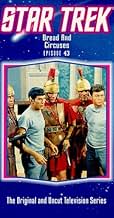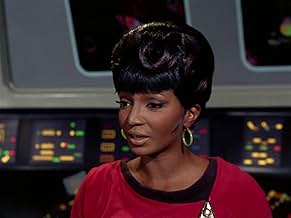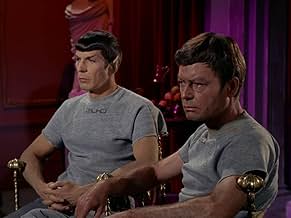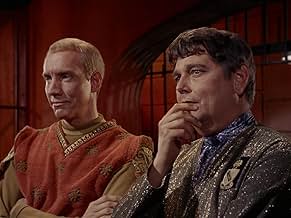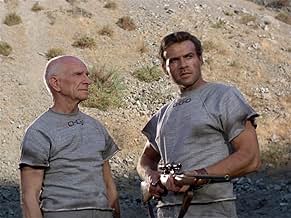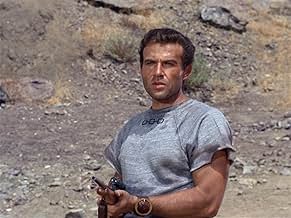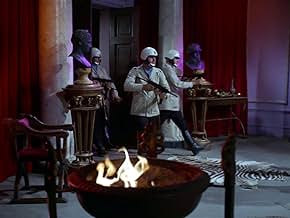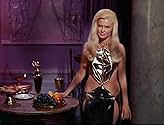Bread and Circuses
- Episode aired Mar 15, 1968
- TV-PG
- 50m
IMDb RATING
7.0/10
3.6K
YOUR RATING
The Enterprise crew investigates the disappearance of a ship's crew on a planet that is a modern version of the Roman Empire.The Enterprise crew investigates the disappearance of a ship's crew on a planet that is a modern version of the Roman Empire.The Enterprise crew investigates the disappearance of a ship's crew on a planet that is a modern version of the Roman Empire.
Bart La Rue
- Announcer
- (as Bart Larue)
Paul Baxley
- Policeman #1
- (uncredited)
Bill Blackburn
- Lieutenant Hadley
- (uncredited)
Frank da Vinci
- Lt. Brent
- (uncredited)
Featured reviews
Communication's officer Lieutenant Uhura sums up the decline and fall of the Roman Empire as the world knows it. The plot is really secondary. It's there to drive the story forward, but the underlying theme tells of the human condition via a reign of pure strength, and its ultimate failure.
This theme is reinforced by one of the supporting characters, an escaped 20th century Roman gladiator, Flavius, and his ultimate sacrifice. He represents the old way, once reformed, but gone back to the rule of Rome by fighting the Romans the only way he knows how.
The basic story is a rescue mission, but the real story is the heartfelt examination of the futility of a society that relies on a slave class to sustain itself on all levels, even down to bloody gladiatorial games as entertainment. Kirk is put through the rigors of experiencing both the pains and pleasures of such a society, and although he understands that he cannot change this world, he does help reinforce the message that will ultimately alter it and its Roman Empire on the most fundamental level.
Note Kirk's line as he talks to Flavius in the cave and pats him on the shoulder. Attach that to Uhura's summation at the end, and you got yourself the entire story: "It's not the sun up in the sky. It's the ..."
Positives; Kirk scores with a hot blonde. Druscilla is a HOTTIE! At least she was in 1967 :-) If I were the captain of the Enterprise I think I would bend the rules a little and beam her up to the ship before breaking orbit. Heck... I'd deserve it! The production values in this episode are also top notch. Largely because we're not dealing with aliens and spaceships here, but a historical retrofit to then modern times.
Excellent social commentary on not only a personal spiritual level, but also on the imperial nature of unbridled profit.
Enjoy.
This theme is reinforced by one of the supporting characters, an escaped 20th century Roman gladiator, Flavius, and his ultimate sacrifice. He represents the old way, once reformed, but gone back to the rule of Rome by fighting the Romans the only way he knows how.
The basic story is a rescue mission, but the real story is the heartfelt examination of the futility of a society that relies on a slave class to sustain itself on all levels, even down to bloody gladiatorial games as entertainment. Kirk is put through the rigors of experiencing both the pains and pleasures of such a society, and although he understands that he cannot change this world, he does help reinforce the message that will ultimately alter it and its Roman Empire on the most fundamental level.
Note Kirk's line as he talks to Flavius in the cave and pats him on the shoulder. Attach that to Uhura's summation at the end, and you got yourself the entire story: "It's not the sun up in the sky. It's the ..."
Positives; Kirk scores with a hot blonde. Druscilla is a HOTTIE! At least she was in 1967 :-) If I were the captain of the Enterprise I think I would bend the rules a little and beam her up to the ship before breaking orbit. Heck... I'd deserve it! The production values in this episode are also top notch. Largely because we're not dealing with aliens and spaceships here, but a historical retrofit to then modern times.
Excellent social commentary on not only a personal spiritual level, but also on the imperial nature of unbridled profit.
Enjoy.
By this point, we begin to see a pattern in Roddenberry's approach to Trek science fiction; he's not interested so much in cosmic concepts as he is in addressing social & political concerns of the present day through the filter of the Trek universe. He's not concerned with believable science fiction concepts in presenting other worlds which should have very different evolutionary stages from our own history. Hence, we've had the virus-stained 'Satan Bug/Omega Man world' ("Miri"), 'gangster world' ("A Piece of the Action" - admittedly a comedy), Nazi world ("Patterns of Force") and 'World War III world' ("Omega Glory"), all just like our own Earth except for a shift in their history to differentiate them. The proper way was to present stories in a parallel universe, but this was a space travel show, so Roddenberry was kind of stuck by his own premise (he includes a brief mention of 'Hodgkin's Law' here to explain the parallel development). Now we have 'Roman Empire' world, a rather effective precursor to the films "Westworld" and "Rollerball" - the title refers to keeping the populace, the mob, satiated with blood sports.
On this world, the Roman Empire never fell, as if continuing for several hundred more years rather than falling apart as it did on our Earth in the 4th - 5th centuries. Gladiatoral combat is on display again (not as silly as in "Gamesters of Triskelion"), now shown on TV rather than the old-time arenas. Cops or Centurians run around with machine guns, wearing motorcycle helmets (see also "Soylent Green" in 1973), but still have swords for the sake of tradition. Slavery has evolved, as well, with most slaves complacent due to an extension of some meager benefits over the centuries (again, a more effective presentation than the cheesy "Gamesters..."). Quite a few concepts were thought out, including some commentary on religion, and most of it comes across as a serious, adult approach. Indeed, there's a coarseness to much of this episode, an edge, reflecting the cruelty of the culture - this empire was a much earlier version of the brutal Nazi regime, after all.
As we've become accustomed to by now, the main trio (Kirk,Spock,McCoy) are the ones who beam down to muck about in this intriguing yet dangerous culture. What comes as a surprise is that they actually adhere to the precepts of their Prime Directive in this one and it shows how tough this directive can be - ironic as this was the time I was kind of hoping Kirk would decide non-interference be damned (again) and lay waste to a city or two in teaching that fat proconsul a lesson in power; the episode succeeds in repelling the viewer to such an extent with all the unpleasantness on this planet that you wouldn't mind the Enterprise 'going Roman' on a few key establishments. The edginess extends to the Spock-McCoy relationship, in that fateful scene when McCoy spells out Spock's fear of living in their jail cell (both appear to accept that death is inevitable for them this time - it is that grim); McCoy's verbal attack appears to be a personal triumph for him but is he so successful at it because he knows what a death wish is like? The scene recalls their tension in "The Immunity Syndrome."
On this world, the Roman Empire never fell, as if continuing for several hundred more years rather than falling apart as it did on our Earth in the 4th - 5th centuries. Gladiatoral combat is on display again (not as silly as in "Gamesters of Triskelion"), now shown on TV rather than the old-time arenas. Cops or Centurians run around with machine guns, wearing motorcycle helmets (see also "Soylent Green" in 1973), but still have swords for the sake of tradition. Slavery has evolved, as well, with most slaves complacent due to an extension of some meager benefits over the centuries (again, a more effective presentation than the cheesy "Gamesters..."). Quite a few concepts were thought out, including some commentary on religion, and most of it comes across as a serious, adult approach. Indeed, there's a coarseness to much of this episode, an edge, reflecting the cruelty of the culture - this empire was a much earlier version of the brutal Nazi regime, after all.
As we've become accustomed to by now, the main trio (Kirk,Spock,McCoy) are the ones who beam down to muck about in this intriguing yet dangerous culture. What comes as a surprise is that they actually adhere to the precepts of their Prime Directive in this one and it shows how tough this directive can be - ironic as this was the time I was kind of hoping Kirk would decide non-interference be damned (again) and lay waste to a city or two in teaching that fat proconsul a lesson in power; the episode succeeds in repelling the viewer to such an extent with all the unpleasantness on this planet that you wouldn't mind the Enterprise 'going Roman' on a few key establishments. The edginess extends to the Spock-McCoy relationship, in that fateful scene when McCoy spells out Spock's fear of living in their jail cell (both appear to accept that death is inevitable for them this time - it is that grim); McCoy's verbal attack appears to be a personal triumph for him but is he so successful at it because he knows what a death wish is like? The scene recalls their tension in "The Immunity Syndrome."
At some point in the second season, things got a little less impressive. The guys find themselves in a culture that puts on shows for a television audience based on gladiatorial battles. The problem here is that there seems to be some stasis here, but when they find out some guy named Merik has broken the prime directive, they realize that they must put a stop to it. We know from the outset that our guys are going to end up in that arena, in front of the television cameras, replete with recorded booing and cheering. They must walk a fine line. This is yet another Starfleet citizen going bad (does anyone screen these guys?) and disrupting the order of a developing planet. It also begs the question of a parallel universe. Tired plots and tired ideas just don't make it.
Kirk, Spock and McCoy visit a planet mirroring the Roman Empire of Earth.
This is an enjoyable but unoriginal episode with some good character moments.
The plot is mostly uninspired as we see yet another Federation character breaking the Prime Directive in a similar way to 'Patterns of Force' and 'The Omega Glory'. I prefer this one to both of the above, but the source of the Roman cultural imitation is not explained, much like the situation on Omega IV. Though, I do like the themes regarding slavery and the role of the entertainment industry to help curtail civil unrest.
The character interactions are good, with the central three having some strong exchanges, particularly Spock and McCoy.
The guest characters are mostly solid, particularly Claudius and Flavius, played well by Logan Ramsey and Rhodes Reason respectively. I enjoyed the scene with Drusilla who suitably entertains Kirk, distracting him from the plight of his two friends.
Where it falls down cinematically is the gladiatorial fights. Not only are they cheaply staged, but poorly choreographed. It looks suspiciously like a one-take rush job. Aside from this the visuals are reasonably good.
William Shatner, Leonard Nimoy, and DeForest Kelley are on good form. It's also nice to see Nichelle Nichols chipping in briefly towards the end, but as always she is underused.
This is an enjoyable but unoriginal episode with some good character moments.
The plot is mostly uninspired as we see yet another Federation character breaking the Prime Directive in a similar way to 'Patterns of Force' and 'The Omega Glory'. I prefer this one to both of the above, but the source of the Roman cultural imitation is not explained, much like the situation on Omega IV. Though, I do like the themes regarding slavery and the role of the entertainment industry to help curtail civil unrest.
The character interactions are good, with the central three having some strong exchanges, particularly Spock and McCoy.
The guest characters are mostly solid, particularly Claudius and Flavius, played well by Logan Ramsey and Rhodes Reason respectively. I enjoyed the scene with Drusilla who suitably entertains Kirk, distracting him from the plight of his two friends.
Where it falls down cinematically is the gladiatorial fights. Not only are they cheaply staged, but poorly choreographed. It looks suspiciously like a one-take rush job. Aside from this the visuals are reasonably good.
William Shatner, Leonard Nimoy, and DeForest Kelley are on good form. It's also nice to see Nichelle Nichols chipping in briefly towards the end, but as always she is underused.
Season 2, episode 25. The Enterprise is on it's routine patrol when it runs across some wreckage of the SS Beagle. The Beagle has been lost for 6 years and it's captain was R. M. Merik, a man Kirk once knew. They find no signs of humans so they guessed that the crew was able to leave the ship before it was destroyed. They follow the debris trail to an unknown planet - never charted before. They discover the planet is very much like planet Earth and even pick up radio and video signals from it. The ship's computer picks up survivors from the Beagle on the planet. Kirk, Spock & McCoy beam down to the planet's surface and are soon met with a group of men with shotguns - they are runaway slaves. Kirk, Spock and McCoy befriend the runaway slaves. It is revealed that their slavery is over a belief or dispute of gods: sun god vs other gods. Kirk is looking for Captain Merik the slaves have mentioned a man named Merikus - is it one in the same man? The planet is similar to Earth's ancient Rome but mixed with 20th century Earth and soon they find themselves in a 20th century jail cell while searching for Merik... they soon find Merik. Merik takes them to the pro-council where Merik explains what happened to him, his crew and the Beagle. Later Kirk is made to order some of his crew members down to fight in the old Roman style arena. He tells Mr. Scott code green, all is well. Scotty knows that means trouble, don't interfere but stand by. Kirk refused to bring down his men so Kirk, Spock and McCoy are taken to the arena in a real fight to the death which is broadcasted on television. The Enterprise can pick up television signals which is in their favor but must stand-by under the captain's orders - Scotty cannot send down a landing party but he can do other things from the ship.
There are some excellent moments between Spock and McCoy - and we are able to learn a bit more about Mr. Spock. Yes Spock does worry about Kirk just like the very human Dr. McCoy.
9/10
There are some excellent moments between Spock and McCoy - and we are able to learn a bit more about Mr. Spock. Yes Spock does worry about Kirk just like the very human Dr. McCoy.
9/10
Did you know
- TriviaThe caves where the Children of the Sun hide out are one of the most-used locations in television and movies. In addition to being the entrance to Batman (1966)'s Batcave, they are also seen in Invasion of the Body Snatchers, Kung Fu (1972) and various police and western shows. They are located right below the famous Hollywood sign.
- GoofsDr. McCoy says ancient Romans were not sun worshipers. Several Roman religions included solar deities, including Apollo, Mithra, and Sol Invictus.
- Quotes
Dr. McCoy: You know why you're not afraid to die, Spock? You're more afraid of living. Each day you stay alive is just one more day you might slip, and let your Human half peek out. That's it, isn't it? Insecurity. Why, you wouldn't know what to do with a genuine, warm, decent feeling.
Spock: Really, Doctor?
Dr. McCoy: [after a pause] I know. I'm worried about Jim, too.
- Alternate versionsSpecial Enhanced version Digitally Remastered with new exterior shots and remade opening theme song
- ConnectionsFeatured in Star Trek Logs: An MTV Big Picture Special Edition (1991)
Details
- Release date
- Country of origin
- Official sites
- Language
- Filming locations
- Production companies
- See more company credits at IMDbPro
Contribute to this page
Suggest an edit or add missing content

